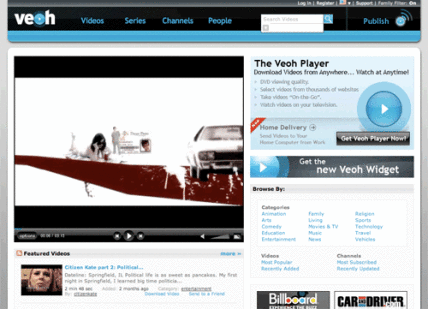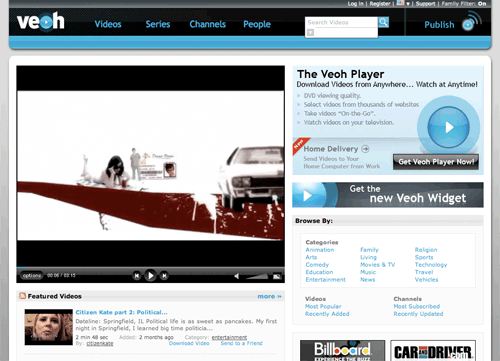
Veoh was a YouTube-like site, funded by Hollywood insiders like Michael Eisner, but who got sued by Universal Music Group, claiming copyright infringement (using more or less the same theories used by Viacom against YouTube). Technically, Veoh sued first (filing for declaratory judgment after receiving a threat letter from UMG, but UMG quickly followed with its own lawsuit). UMG played dirty, not just suing the company but directly suing its investors as well. This was a pure intimidation technique, designed to scare major investors into either pulling investment or ordering the company to change course, even if what they were doing was legal. While the court dismissed the charges against the investors (and scolded UMG in the process), the intimidation might have worked. In the middle of all of this, Veoh shut down, because it ran out of money, mainly due to the lawsuit. It sold off its assets to another party, and somehow scraped together a little money to keep the lawsuit, and just the lawsuit, going.
Since then, there have been a series of rulings that have repeatedly found Veoh to be legal and protected under the DMCA’s safe harbor. The district court found in Veoh’s favor, as did the 9th Circuit appeals court. Yesterday, the appeals court ruled again on the issue, with a superseding opinion that, once again, says that Veoh was legal. Even though it’s still dead. The ruling not only reiterates the importance of DMCA’s safe harbor protections for user-generated sites like Veoh, but also shows how that still applies even given the 2nd Circuit’s slightly weaker view of the DMCA safe harbors.
The court goes through a nicely detailed explanation for why Universal Music’s interpretation of the DMCA doesn’t make any sense at all and would not only create internal conflict within the law, but also make the safe harbors effectively meaningless. Specifically, Universal Music tries, ridiculously, to argue that DMCA safe harbors aren’t supposed to apply to any service that makes files accessible to the public. As the court points out, if that were the case, the law would be silly, since copyright holders would never learn about that infringement anyway, since the works wouldn’t be available for them to find. The court points out it’s ridiculous to think that DMCA safe harbors were only meant to apply to backup services.
We do not find persuasive UMG’s effort to reconcile the internal contradictions its reading of the statute creates by positing that Congress must have meant § 512(c) to protect only “web hosting” services. Web hosts “host” websites on their servers, thereby “mak[ing]storage resources available to website operators.” The thrust of UMG’s argument seems to be that web hosts do not undertake the sorts of accessibility-facilitating functions that Veoh does, and thus the services they perform “fit within the ordinary meaning of ‘storage,’” and thereby “harmoniz[e]” with the notice and takedown procedures. UMG’s theory fails to account for the reality that web hosts, like Veoh, also store user-submitted materials in order to make those materials accessible to other Internet users. The reason one has a website is so that others may view it. As amici note, these access activities define web hosting – if the web host only stored information for a single user, it would be more aptly described as an online back-up service.
The court also rejects a theory — popular among some of our maximalist commenters — that the DMCA was only intended for purely “web hosting” companies, rather than being broadly applied across various online services such as user-generated service providers. As the court noted, if Congress wanted to limit the safe harbors in that manner, it would have said so: “Had Congress intended to include such a limitation, it would have said so expressly and unambiguously.”
The next damaging part for Universal Music: Veoh was really good at taking down videos when it received DMCA notices. UMG tried to argue that Veoh had knowledge of infringing works on its site that it didn’t remove. This argument is the crux of the YouTube/Viacom case as well: is “actual knowledge” from DMCA notices, or what kind of knowledge creates “red flag” awareness. The DMCA can be read in self-contradictory ways at points. For example, it says that a provider only has to takedown content if it receives a DMCA notice that follows somewhat strict procedures. But, then, also talks about if there’s “red flag” awareness. Take both literally, and you could, for example, wonder what happens if someone sends an improperly structured DMCA notice (say, missing certain elements), but indicates infringing works, nonetheless. Is that “red flag” knowledge? Here, as in the YouTube case, though, UMG relies on a much broader definition of red flag knowledge, in which it kind does a “but they must have known!” sort of thing. It’s basic argument: there was music on Veoh, and Veoh had to know that was infringing. The court is not buying it. First of all, just because there’s music, it doesn’t mean it’s infringing.
As an initial matter, contrary to UMG’s contentions, there are many music videos that could in fact legally appear on Veoh. “Among the types of videos subject to copyright protection but lawfully available on Veoh’s system were videos with music created by users and videos that Veoh provided pursuant to arrangements it reached with major copyright holders, such as SonyBMG.” Further, Congress’ express intention that the DMCA “facilitate making available quickly and conveniently via the Internet . . . movies, music, software, and literary works” – precisely the service Veoh provides – makes us skeptical that UMG’s narrow interpretation of § 512(c) is plausible. S. Rep. No. 105-190, at 8. Finally, if merely hosting material that falls within a category of content capable of copyright protection, with the general knowledge that one’s services could be used to share unauthorized copies of copyrighted material, was sufficient to impute knowledge to service providers, the § 512(c) safe harbor would be rendered a dead letter: § 512(c) applies only to claims of copyright infringement, yet the fact that a service provider’s website could contain copyrightable material would remove the service provider from § 512(c) eligibility.
Later on, the court makes a key point that we’ve reiterated over and over again — every time copyright holders and maximalists insist that service providers need to become copyright cops — that the service can’t become copyright cops because they have no idea if stuff is actually authorized or not:
Copyright holders know precisely what materials they own, and are thus better able to efficiently identify infringing copies than service providers like Veoh, who cannot readily ascertain what material is copyrighted and what is not.
That message is something that the various lawyers representing MPAA and RIAA affiliated companies should be forced to write on a blackboard over and over again until the point is driven home.
Of course, in the YouTube case, with the original district court ruling, there were similarly strong statements, but the 2nd circuit walked it back somewhat, suggesting that a different standard need apply to “red flag” knowledge. Here the court points out that, even if that’s true, Universal Music would need to show a lot more to prove any red flag knowledge.
Of course, a service provider cannot willfully bury its head in the sand to avoid obtaining such specific knowledge. See Viacom Int’l v. YouTube…. Even viewing the evidence in the light most favorable to UMG as we must here, however, we agree with the district court there is no evidence that Veoh acted in such a manner. Rather, the evidence demonstrates that Veoh promptly removed infringing material when it became aware of specific instances of infringement. Although the parties agree, in retrospect, that at times there was infringing material available on Veoh’s services, the DMCA recognizes that service providers who do not locate and remove infringing materials they do not specifically know of should not suffer the loss of safe harbor protection.
The ruling goes on in this nature. It’s definitely a good ruling that lays out, yet again, why the DMCA safe harbors protect internet companies, and blasts holes in the silly theories of some of the big legacy players that have tried to wipe out those safe harbors. It does send one small issue back to the lower court — an exploration of whether or not Veoh is due certain fees (excluding attorneys fees). This is more of a procedural issue than anything else.
So, once again, Veoh has proven that internet services like it are protected by the DMCA from being blamed for users infringing. And yet, the fact that it had to effectively shut down and just sell off its assets, is a reminder of just how much the big copyright players can stifle and kill off innovative services via copyright law, even when they have no case.
Written by Mike Masnick



